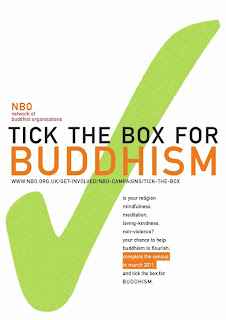The Network of Buddhist Organisations are asking all Buddhists to support them in their campaign to 'tick the box for Buddhism' in the census, March 2011.
They say:
Please join our campaign ‘Tick the Box for Buddhism’.
What’s it all about? The next census, in March 2011, will include a voluntary question about religious affiliation. This was controversial in the last census in 2001 because many felt that it was an invasion of privacy and that the information might be abused. Several hundred thousand Jedi Knights demonstrated their opposition by coming out as a new religion.
Those worried about how the religious affiliation figures might be used were right to be concerned. They have been used to determine relative levels of representation, access, and funding made available through government, charities and public organisations to faith groups.
Levels of recognitions have been adjusted according to the relative proportion of the ‘vote’ a faith received on the census. Based upon the last census figures the lion’s share of influence has been taken by the large and established religions.
Although the census figures are used as though they accurately represent religious affiliation in the UK, they are misleading. Firstly, the census question is a leading one and asks ‘What is your religion’ rather than asking alternatives such as:
‘Do you belong to a religion, if so which?’, or ‘Which faith or religions do you most support?’
The choices available only list the six official major faiths – Buddhist, Christian, Hindu, Muslim, Jewish and Sikh faiths, (and ‘none’ and ‘other’) – and they do not distinguish between cultural, lukewarm and serious religious practitioners.
The question favours cultural affiliation to religion (the feeling that one has the same religion as one’s parents or ethnic group even if one does not practice) rather than those who actively practice a faith.
Secondly, evidence suggests that many who are sympathetic to Buddhism, and who may practice mindfulness and meditation, or who are inspired by or respect its teachings, did not indicate that they were Buddhists on the 2001 census. Western Buddhists in particular are uncomfortable with adopting labels, or with feeling forced to express a religious identity.
Because of these problems with the census question on religious affiiliation, we would prefer that it was not included and that other more precise and frequent surveys were used to determine how religion influences British citizens.
However, since the question is to remain to guide government policy for the next ten years then many of us would like to see more accurate figures for Buddhism. Buddhism brings a moderating and common-sense influence to religious issues which is sorely needed. And it is the only non-theistic faith ( one which does not worry about ‘God’) amongst the major faiths. Based upon the levels of interest shown in Buddhist practices, mindfulness, retreats, information and books, we think it is reasonable to anticipate that up to half a million citizens could ‘tick the box’ for Buddhism in the next census if they realised the importance of doing this.
If this were the case we would expect Buddhism and its values to be more visible and to exert more influence. And perhaps most importantly, greater support for Buddhism would demonstrate public demand for religiously inspired behaviour that UK citizens admire and want to encourage – behaviour based on compassion, generosity, tolerance, non-violence, humility, rational discourse, and proven meditation and spiritual teachings.
With greater support for Buddhism we would also expect that mindfulness and other meditation practices which are proving very helpful for general well-being, would be more widely taught in schools and that the religious curricula might give more emphasis to the human values and behaviour that we share in common and admire – compassion, kindness, generosity, wisdom and meditation and rational inquiry – rather than religious doctrine that tends to be divisive.
So, if you have been inspired by, or benefited from, Buddhism through meditation, mindfulness practice, or attendance at a Buddhist group or retreat, please indicate your support by ticking the Buddhist box on the 2011 census. And we want to encourage all Buddhists to ask their friends, in Buddhist temples, monasteries and mindfulness centres, and other sympathetic groups, and in internet social networking sites and forums, to do the same.

No comments:
Post a Comment